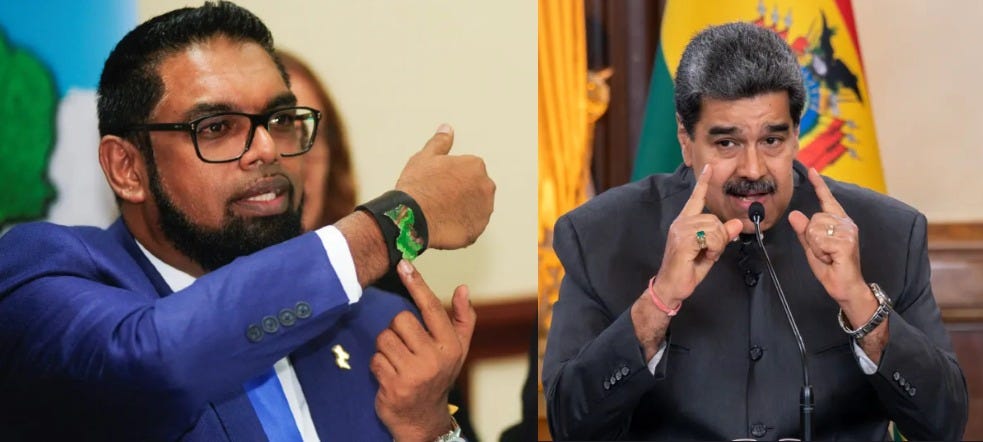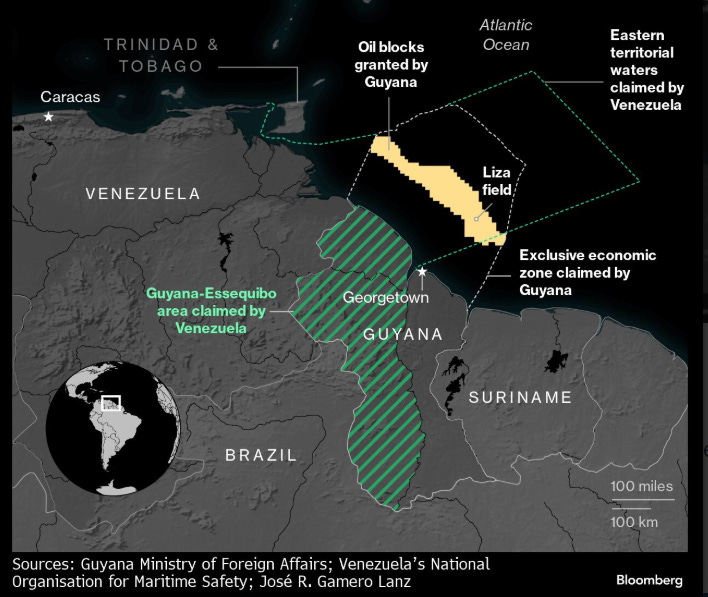Venezuela-Guyana Conflict Escalates, France Teases Nuclear Umbrella, China Bans 25 U.S. Defense Firms and Imposes 100% Tariffs on Canada, U.S. Pauses Intelligence Sharing with Ukraine, and More
Grinfi Political Risk Intelligence Weekly Briefing
Welcome to this week’s edition of Grinfi Political Risk Edge, your trusted source for expert political risk analysis and strategic intelligence. In this issue, we examine key geopolitical events shaping the defense, energy, and DeFi markets, providing a deep, beyond-the-headlines assessment. Anticipate, Adapt, and Excel!
But first, let’s kick off the week with a laugh 😄 to lighten the mood.
French: "Il y a deux choses qu’un peuple démocratique fera toujours avec peine : commencer une guerre et la finir.”
English: "There are two things a democratic people will always find difficult: starting a war and ending it."
Alexis de Tocqueville, De la Démocratie en Amérique, Vol. I, 1835, Chapter 22, p. 228.
Disclaimer: The opinion expressed in this quote does not represent our views but is intended for reflection purposes only.
From Grinfi Political Risk Observatory (GPRO), here’s what we’re monitoring:
High-Impact Updates
On March 1, decades-long tensions between Venezuela and Guyana escalated further over the disputed Essequibo region. President Nicolás Maduro called Guyana “fascist” and declared ExxonMobil’s operations “illegal.” A Venezuelan warship entered Guyana’s EEZ near Exxon’s Liza Destiny platform, prompting Guyana to seek ICJ intervention. Venezuela plans to hold elections in the region on April 27, following a controversial December 2023 referendum that led to the annexing of the 61,600-square-mile territory. The dispute threatens Exxon’s $10 billion annual output, with a 20-30% disruption risk if clashes occur. While Venezuela grapples with severe political and economic turmoil, Guyana’s economy is thriving due to massive oil revenues. Tighter U.S. and EU sanctions on Venezuela are likely. Brazil has offered to mediate, but China’s support for Caracas complicates negotiations.
On March 7, China’s Ministry of Commerce sanctioned 25 US defense companies, including major Lockheed Martin units, in response to US military support for Taiwan and Ukraine. The move threatens $2-3 billion in annual US exports and disrupts aerospace supply chains, affecting 60% of the firms involved. In addition, China has announced retaliatory tariffs on Canadian agriculture, imposing 100% tariffs on canola oil, canola meal, and peas and 25% tariffs on pork and aquatic products, effective March 20, 2025, in response to Canada’s 100% tariffs on Chinese EVs and 25% tariffs on Chinese steel and aluminum imposed in October 2024.
On March 5, CIA Director John Ratcliffe confirmed a pause in intelligence sharing with Ukraine, citing rising tensions. The move aligns with a U.S. warning to Russia, stating it could be cut off from SWIFT and face harsher sanctions unless a ceasefire is reached by April 1.
On March 6-7, Russia carried out a large-scale missile and drone attack on Kyiv and Kharkiv, killing over 200 and causing $1.2 billion in infrastructure damage. Russian forces continue to advance in the Donbas, worsening the humanitarian crisis and straining Ukraine’s power grid.
During the March 3-8 Two Sessions, Foreign Minister Wang Yi reaffirmed China’s commitment to “strategic autonomy” and announced a 7% increase in defense spending, bringing the total to $240 billion.
At the March 6 EU summit, leaders agreed on additional funding for Ukraine and approved sanctions on 50 Russian entities. However, only 60% of the pledged 2024 aid has been disbursed. Sanctions evasion through Turkey and India remains a concern, while fiscal pressures on Germany and France could limit future commitments.




